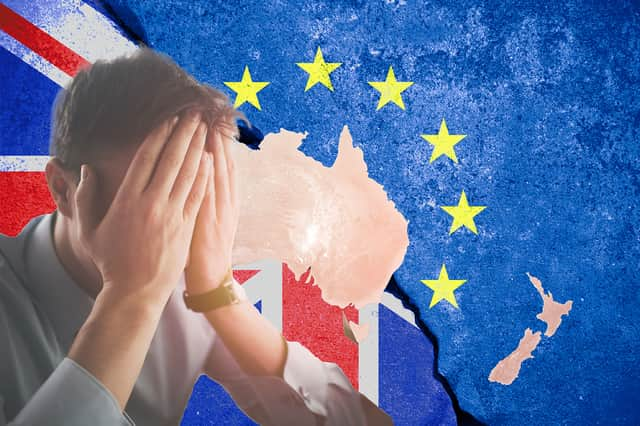Brexit: three in five export businesses see no positive effect of free-trade deals, government research finds
and live on Freeview channel 276
Almost 60% of British export businesses see no positive effect from post-Brexit trade deals, the government’s own research has found.
More than four in 10 goods businesses and three in 10 service firms say their exports have decreased, with the UK leaving the European Union the most commonly cited reason. These findings were part of an annual survey carried out by the Department of Business and Trade with 3,000 UK export businesses with a turnover of at least £500,000.
Advertisement
Hide AdAdvertisement
Hide AdThis found that while positivity around free trade deals is dropping, from 33% in 2021 to 31% in 2022, at the same time the proportion of businesses who see no effect increased from 54% to 58% in 2022.
The ability to sign free trade deals independently was touted as one of the main positives with Brexit, however agreements with Australia and New Zealand have been predicted to have limited economic impact.
While farmers have told NationalWorld that these agreements are an “absolute disaster” for them, claiming that UK beef and lamb will be undercut by imports.


It comes as Brexit regret is at an all time high. Polling by YouGov has found that 57% of voters believe that leaving the EU was a mistake, while 50% want to rejoin compared with 30% who would still vote leave. And now a plurality of voters would like to see another EU referendum in the next 10 years, 46% compared to 36% who are against this.
Advertisement
Hide AdAdvertisement
Hide AdThe DBT’s report said: “Concerns relating to the UK’s exit from the EU continued to be prominent. This included concerns about demand for UK products and services, supply chain issues, customs procedures, documentation, and administrative burdens.”
Jo Foster, who owns two independent businesses in Rishi Sunak’s constituency of Richmond in North Yorkshire, told NationalWorld that she had to stop exporting aromatherapy products due to Brexit red tape.
She said: “Every single cost has gone up. We had a business where we were selling to Europe, to retailers as well as selling to customers. We pretty much had to pull the plug on that, because we’re too slow to cope with the extra cost and extra time.”


Jo explained that she had to pay someone, who was effectively her agent, in Ireland to use their address, when sending products to the EU.
Advertisement
Hide AdAdvertisement
Hide AdWill Bain, head of trade policy at the British Chambers of Commerce, said: “It doesn’t surprise me that companies feel pretty sore about things and that is what our survey data shows as well. But it is also true that we’re in a better place than we were last year and the government has been listening to some of our concerns.”
The CEO of British Independent Retailers Association, Andrew Goodacre, previously said nearly all independent businesses who trade with Europe have seen profit losses due to Brexit.
While North Wiltshire arable and beef farmer Liz Webster, who is also the founder of Save British Farming, told NationalWorld: “There’s no benefit to any of these trade deals, the Australia and New Zealand deals are an absolute disaster for us [farmers].
“They’re great for Australia and New Zealand, but the processors will choose their meat instead of ours, because we’re still tied to high standards.”
Advertisement
Hide AdAdvertisement
Hide AdJohn Glen, the Chief Secretary to the Treasury, said “this government is not complacent about the challenges that we face”, but cited insurance investments and pharmaceutical freedoms as positive moves from Brexit.
He told BBC’s Today Programme: “Look, the country made a decision in 2016, and as a government minister, myself and my colleagues, are doing everything we can to maximise the opportunities that those increased freedoms give us.”
While a DBT spokesperson said: “Selective use of polling stats only paints half a picture..
“Fifty-eight per cent of these same businesses said there is a lot of opportunity to grow internationally and the majority of companies who are ready to export, or export already, are using our expert support services to grow their business.”
Comment Guidelines
National World encourages reader discussion on our stories. User feedback, insights and back-and-forth exchanges add a rich layer of context to reporting. Please review our Community Guidelines before commenting.
